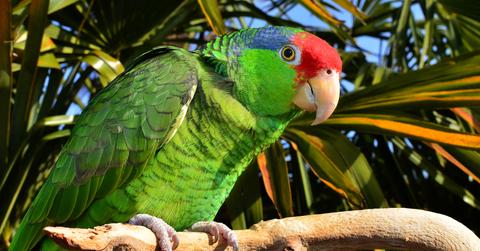Conservationists Suggest Moving Endangered Species Into Cities
The red-crowned parrot has been an accidental Los Angeles native for decades. But what if we intentionally brought threatened animals to urban habitats?
Updated Oct. 31 2018, 4:14 p.m. ET
Animal advocates have been testing all sorts of strategies to help endangered species. They’ve released zoo-bred babies into the wild, mapped trees, and even brewed beer. But now, scientists at UCLA have proposed a truly unconventional solution: introducing vulnerable creatures into our cities.
It’s already happened in Pasadena, where a sizeable population of feral red-crowned parrots have roosted since the 1980s. CityLab estimates roughly 2,000 to 3,000 of these birds reside in the Los Angeles area, and the parrot has a similarly strong presence in pockets of Florida and Texas. Conservationists now believe there are more red-crowned parrots in the United States than in Mexico, the birds’ native home, where the species is considered endangered.
These parrots have led some scientists to argue for “sanctuary cities,” or urban hubs for animals who face extinction. The advocates most recently made their case in Smithsonian Magazine, where they proposed introducing select non-native species to artificial habitats in cities.
The argument is illustrated neatly through the red-crowned parrots, which arrived in Pasadena by accident. There was no concerted conservation effort, no coordination between zoos to get them there. Most experts believe they escaped a pet shop or came to the Los Angeles area through questionably legal pet trade. But in either case, they managed to build a large feral colony once they arrived.
So if creatures like the parrots are going to come to cities anyway, UCLA biologist Brad Shaffer reasons, why shouldn’t we plan for it?
"There are a lot of parrots out there in the world, and some parrot is going to show up,” Shaffer told Smithsonian Magazine. “So, wouldn't we rather have a larger fraction of those non-natives be [a species that is] seriously endangered in its home turf? Then at least we're accomplishing something."
Ursula Heise, Shaffer’s UCLA colleague who also produced a docu-short on the birds, concurs. She envisions an entire “urban ark” — a multispecies sanctuary in Los Angeles for threatened animals.
“Something's going to get out [to an unoccupied habitat] eventually," Heise said in Smithsonian Magazine. "Wouldn't you rather have something that you chose than something that gets out by sheer luck?"
Critics counter that the situation would be too unpredictable. Would the selected species adapt to cities well, or wreck havoc? How would they interact with native animals? And what kind of intervention would be appropriate?
Shaffer insists the animals could be managed with the right planning and attention.
“Non-native species in urban environments ... [tend to] rely on people,” he told the magazine. “They rely on us watering lawns, they rely on fruit trees. ... They need us, they need our artificial environments."
He continued, “It won't be perfect, and there will be some [introductions] that go wrong, but we have to do better than just sitting back and waiting."
Such migrations have been discussed and tested in the past, and they haven’t always gone according to plan. In the 200 years since the so-called “stink tree” arrived in America via China, it’s grown so excessively that it’s now muscling native plants off their turf. (The species also produces a toxin that limits other trees’ growth.)
But proponents for the sanctuary cities believe they’re a viable way to help vulnerable species — especially as their habitats erode due to climate change.
